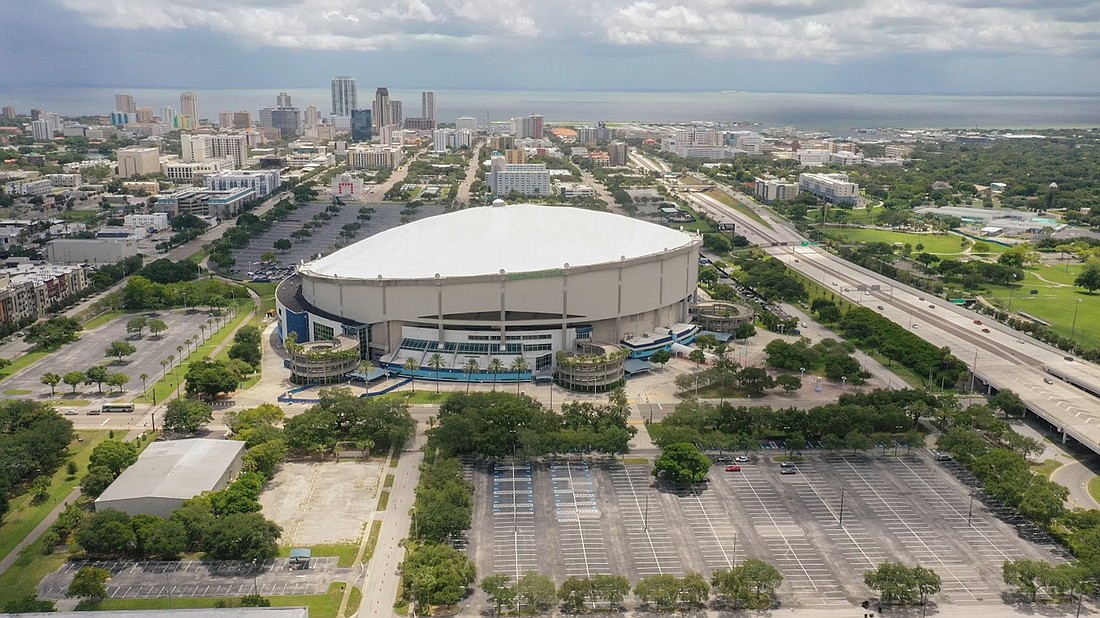- January 14, 2025
-
-
Loading

Loading

Among the loftier ideas contained in developers’ proposals to re-invent the Tropicana Field site in St. Petersburg is a concept to de-emphasize Interstate 175 or its associated ramps, which border the 86-acre, city-owned property.
Nearly half of the seven proposals submitted to the city in January specifically embraced Florida Department of Transportation intentions to either remove or de-escalate the highway, which represents a physical barrier to city access that has greatly impacted African-American neighborhoods.
“As I’ve said time and again, this is our chance to get it right, and to right wrongs,” St. Petersburg Mayor Rick Kriseman says about the Tropicana Field redevelopment and its potential for future growth and inclusion.
When Tropicana Field was constructed in the late 1980s, more than 250 buildings were razed, in excess of 500 homes relocated, nine churches were displaced and some 300 businesses either closed or moved. Development of Interstates 275 and 175, beginning in the 1970s, caused similar disruption.
The Interstate 175 plans have gained traction of late because federal officials say they intend to earmark money to either relocate, eliminate or alter inner-city highways that have disproportionately hurt communities of color and low-income residents. In December, incoming U.S. Department of Transportation Secretary Pete Buttigieg indicated his support for changing urban highways.
“Black and brown neighborhoods have been disproportionately divided by highway projects or left isolated by the lack of adequate transit and transportation resources,” Buttigieg wrote on Twitter. “In the Biden-Harris administration, we will make righting these wrongs an imperative.”
A month later, a bill was introduced into Congress to allocate $10 billion to develop a pilot program to raze urban highways. The “Highways to Boulevards” initiative, as it has come to be known, would study removing sections of highways that have adversely affected neighborhoods, mostly in Black communities such as the one south of the Tropicana Field site.
The initiative comes, too, as the city has whittled the Tropicana Field redevelopment proposals down to four.
Teams led by Portman Holdings/Third Lake Partners, Sugar Hill Community Partners, Unicorp National Developments and Midtown Development will soon present additional information about their proposals, the city says.
City officials say the four “best represented the criteria contained within the (request for proposals)” and have a “proven track record of executing large, mixed-use developments.”
Kriseman, in a statement earlier this month, described the four as “truly exceptional.”
Beginning next week, the city intends to hold a series of virtual and in-person meetings to outline the proposals and receive community input on them. The city also plans to set up showrooms that outline the proposals and contain renderings of what the redeveloped property would look like when completed. Kriseman plans to select a development partner from among the four submissions in either May or June and reach a development agreement with the winning team in either September or October, according to the city’s website.
And while the potential altering of I-175 is but a small part of the four teams’ plans — Portman Holdings/Third Lake’s proposal calls for as much as $2.6 billion in development and social programs, while Sugar Hill’s concept tops $3 billion — each recognizes the potential impact such a move could have.
"The potential alteration of the elevated I-175 into a ground-level, highly walkable boulevard offers exciting possibilities for re-establishing the physical connection between the EDGE District; The Tropicana Redevelopment; and the communities of Campbell Park, Melrose Mercy, Roser Park, and the Innovation District,” Portman/Third Lake’s proposal states.
Sugar Hill’s plans both endorse de-emphasizing the highway and developing a new footbridge for pedestrians over it.
“Removing the (I-175) spur and replacing it with an at-grade thoroughfare presents a transformational opportunity to reconnect St. Petersburg’s southern neighborhoods to the Tropicana Field site and broader urban support systems including job opportunities, economic growth, social engagement, entertainment, and open space,” Sugar Hill’s proposal states.
“Significantly, I-175 runs through historic Sugar Hill, so its removal would be a powerful symbolic statement about reclaiming and reconnecting to the heart of the African-American neighborhood that once occupied the site,” the team’s proposal adds. “We believe that removing the spur will also generate significant overall benefits to the project.”
And Unicorp National’s plan envisions I-175 ramps be turned into a “Greenway Park.”
“Re- weaving together the tear that occurred when it was constructed, in today’s context, will undo the tear of the fabric of the city,” Unicorp National’s plan states.
“The benefits of transforming this zone into community recreational gathering areas add to the values of resiliency, health and wellness goals of the City’s Integrated Sustainability Action Plan (ISAP).”